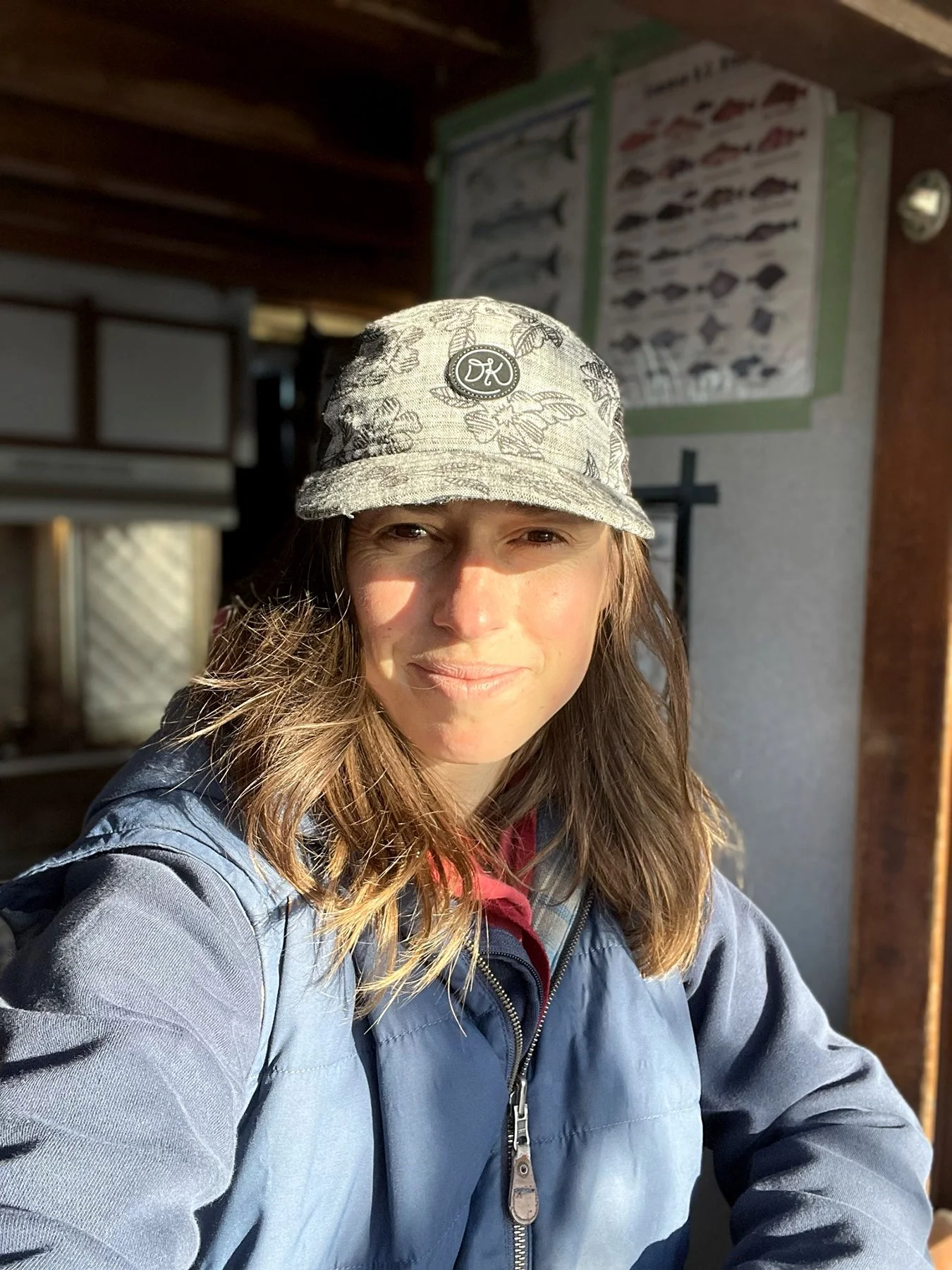Becky Acheson
2nd GENERATION FISHERMAN
Home Port: Salt Spring Island, BC | Vessel Name: Pacific Prowler
“Wild Pacific halibut fishermen work so hard. It’s difficult to convey all that fishing families must do to provide this nourishing food to consumers.”
1. When and how did you start fishing?
I have been fishing all my life. My dad, Chris Acheson was commercial fishing when I was born and it has been part of my life ever since. We just found a photo of me sitting patiently in my stroller at the dock while my parents worked on the boat.
2. Where do you usually fish?
These days we fish for wild Pacific halibut off of Haida Gwaii.
3. What is the best thing about fishing?
That’s a hard question because there are a few things and when they all come together fishing is just the best. It’s the adventure, all the moments when you’re in awe of the ocean and this beautiful coast, and the time you get to spend with your family. I’ve also become thankful of having the opportunity to work hard, too. Nothing feels better than that. Then it all comes together into that one perfect moment when you’re out on the boat fishing, you are so sore but feeling strong, you see nothing but the ocean just non-stop crashing onto the most stunning cliffs and mountains, and you look up and your family is giving you a look that says, “this is crazy but awesome .... right?”. The best.
4. What is your most memorable fishing experience?
My husband, Dane and I have been making some pretty special memories over the last few summers salmon trolling with our three boys who are now nine, seven and three years old; but, my most memorable trip would be “the family wild Pacific halibut trip” back when I was 11 years old. Now I’m wondering what my dad was thinking when he loaded up my aunt, uncle, three cousins, my stepmom and me to come with him to finish his halibut fishing for the year around Haida Gwaii. He somehow pulled off the perfect balance of fun and work. Although, when everyone else was working, I remember my cousin and I instead making kelp dolls and trying to see who could “surf” on a big halibut for the longest time. We would venture to the beach (…or maybe we were sent to the beach) and we were given a lot of freedom to just be kids.
5. What do you believe everyone should know about wild Pacific halibut and the fishery?
Wild Pacific halibut fishing is such hard work. Commercial fishing is known to be a hard job, but I think harvesting wild Pacific halibut has to be the hardest both mentally and physically. The challenge starts right at the dock with all the gear and supply preparations. That’s a lot of what I now do for my fishing family. Then when you finally get to the fishing grounds you have to be so on it, for safety reasons and to selectively target halibut successfully. Whether you’re baiting hooks or setting gear on the back deck or you’re in the wheelhouse navigating the ocean floor, you cannot lose focus or it could result in serious consequences. Then when you start hauling in the gear, it’s game on for hours and sometimes days. And once you start you have to keep going – you have no choice. This is what makes halibut fishing so challenging and potentially also dangerous if you’re not careful. Halibut fishermen are super tough.
6. What do you believe are the most important issues facing the wild Pacific halibut industry today?
As the wife and daughter to wild Pacific halibut fishermen, I have to say that wild Pacific halibut fishermen put everything on the line to bring these fish to the market. It’s very hard to hear people make negative comments about the price of wild seafood when my husband and dad have made major investments to make sure that there is proper fisheries science and catch monitoring programs in place and they’re at home recovering physically and mentally after a long, grueling trip. I usually respond that “halibut fisherman work so hard”, and consumers need to know what is involved for fishing families to provide food.
7. How would you describe the future of the wild Pacific halibut fishery?
I believe the management of the wild Pacific halibut fishery is ahead of that of other fisheries with its continuous data collection and international management. This is what will make it possible to continue the fishery into the future.
8. What three words best describe the wild Pacific halibut fishery today?
Accountable, hardworking and persevering
1. What was your first job?
Working as a wild Pacific halibut deckhand when was 11 years old. Or maybe pulling broom weeds at home for 5 cents a plant!
2. What is your favourite thing to do when you’re not fishing?
I never get sick of being on the water and exploring the coastline. I also love skiing which works great for the fishing off-season.
3. What is your favourite meal to eat on the boat when fishing?
Bacon and pancakes. Big breakfasts are key on the boat at any time of the day.
4. What is your favourite wild Pacific halibut dish?
Fish cakes. (Shhh, don’t tell anyone but halibut isn’t my favourite, since my dad fished halibut most of my childhood and it was on the table more often than I would have liked. Too much of a good thing, I guess.)
5. What is your favourite movie or TV show of all time?
We’ve been re-watching The Office. It’s still so funny!
6. What is your favourite song or who is your favourite artist?
I wouldn’t say that I have a favourite artist, but I almost always have 90s Hip Hop downloaded on my phone.
7. What is one thing that most people don’t know about you and may surprise them?
Well, when I meet people for the first time, it is usually a surprise to them that Chris is my dad - not Dane’s dad - and that I grew up commercial fishing. (Dane grew up on a ranch in Alberta.) I might still have more sea hours than Dane and I always tell our kids I have caught more fish than him!
8. What skill or craft would you like to master?
At the moment, I think public speaking is the best skill for me to master. Although maybe before that I should work on my listening skills. I would also like to master my marine skills to make use of all my sea time and work on some tickets during the next couple of years.
9. Who is your hero and why?
My dad. He has fished now for over half a century! All that time he has also been working on other skills that have been challenging for him to learn. He’s now very competent at negotiating, writing, public speaking, advising, critical thinking and maybe the hardest - patience.
This project is supported by the BC Government Buy BC Partnership Program: delivered by the Investment Agriculture Foundation of BC with funding from the Government of British Columbia.
The Government of British Columbia is committed to working with industry partners. Opinions expressed in this document are those of [the authors] and not necessarily those of the Government of British Columbia or the Investment Agriculture Foundation of BC.



